The Bombardier Iltis Is Canada's Jeep
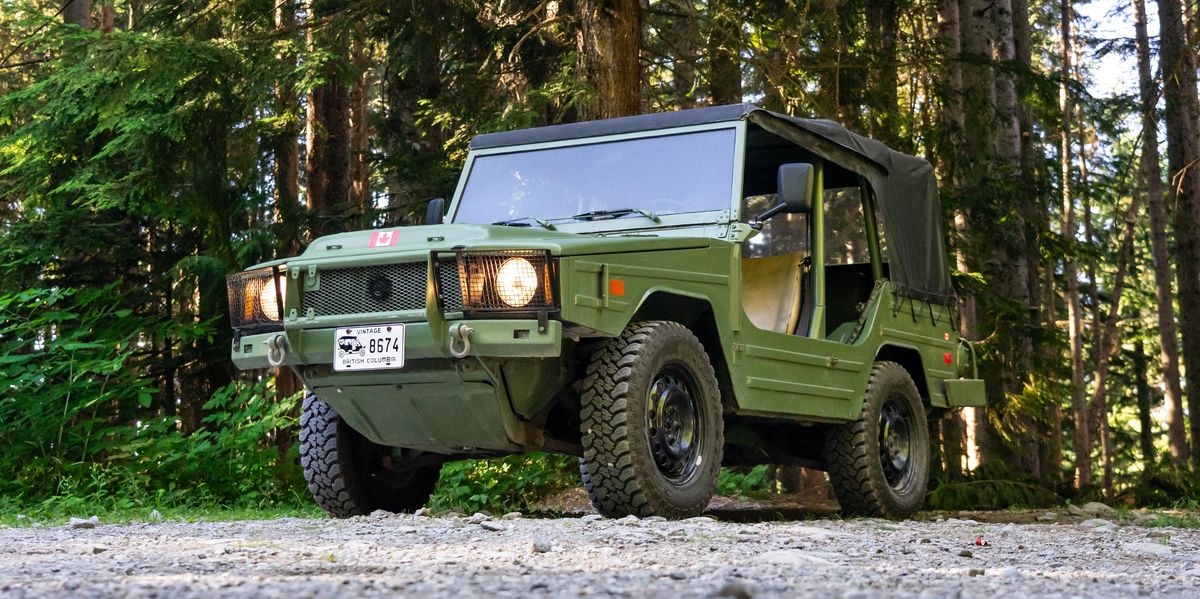
Crashing along a gravel road atop Mount Seymour in British Columbia, an oddball of Canadian military history does its level best to pulverize the spinal columns of its passengers. This is a Bombardier Iltis, an ugly duckling built in Quebec in the mid-1980s. It’s Canada’s version of the Humvee: Martin Short as compared to Arnold Schwarzenegger.
Brendan McAleer|Car and Driver
Because of its short wheelbase and zero concessions to passenger comfort, every pothole and washout is accompanied by bangs and rattles. Acceleration is on the poky end of the scale, but when the Iltis is finally at speed, a blustery wind swirls through the bare metal cabin.
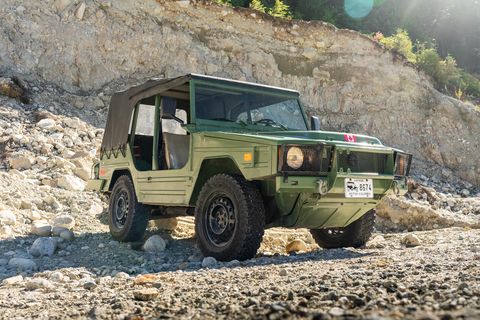
Brendan McAleer
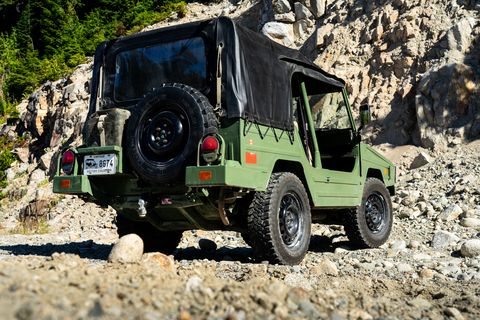
Brendan McAleer
“Uh-oh,” says owner Helen Poon, glancing at the fuel gauge. It reads empty. Slowing slightly, she gives it an almighty whack, and the needle springs up to half-full, as might happen in a World War II–era Hawker Hurricane on patrol over the English Channel. The Iltis bounds onward over the gravel, uncomfortable yet unstoppable.
On the pavement, the Iltis is actually fairly well behaved, though the stopping performance, or lack thereof, of the drum brakes is mildly alarming. Then again, you’re never carrying much speed. To park, you twist a knob on the end of the parking brake to pull up any slack in the line, then pull on the lever. Fully, uh, deployed, the lever is more than a little priapic.
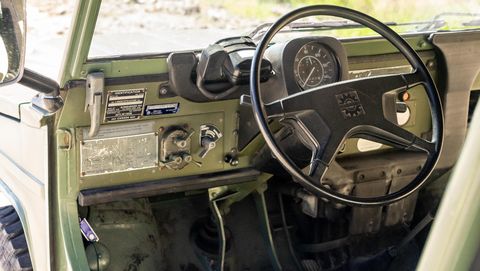
Brendan McAleer
Iltis is the German word for a polecat, Mustela putorius, a forest-dwelling European mammal that’s like a weasel, minus the charisma. There are several subspecies, and this one is of the Volkswagen/Audi family.
In the early 1970s, the West German army put out a call for a replacement for its mainline vehicle, the Type 181 Mehrzweckwagen. Mehrzweck means multipurpose, but readers will possibly best know this car in its civilian form as the Volkswagen Thing. It doesn’t take much squinting to see the resemblance between the slab-sided VW and this decommissioned Canadian soldier.
West Germany wanted a great deal of capability for its new military mule, but it had to remain compact enough for European roads. The brief also indicated it needed to be portable by helicopter, capable of carrying an 1100-pound payload, and able to ford two feet of water.
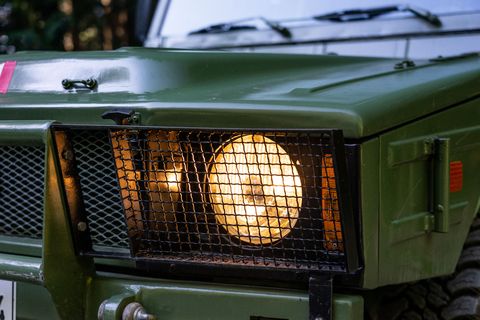
Brendan McAleer
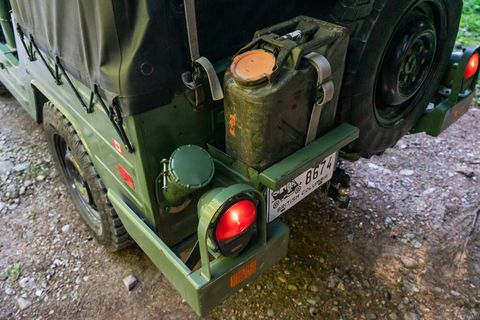
Brendan McAleer
At the time, Volkswagen had recently formed Audi by consolidating the Auto Union group of companies under a single banner. Among those companies was DKW, which built the Type 182 Munga, the heroically durable and incredibly ugly follow-up to the Type 181 (Porsche even made an attempt to build its own Type 181 replacement, the Jagdwagen). VW tasked Audi’s engineers with updating the Munga platform, including a new four-wheel-drive system and a Volkswagen-sourced 1.7-liter four-cylinder engine.
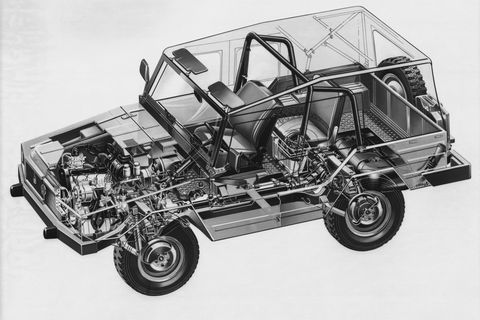
Volkswagen
It’s worth noting here that this funky little off-road garden shed can claim direct responsibility for the likes of the Audi R8 and possibly even the Bugatti Veyron.
At the time Audi developed the Iltis, it was a company that chiefly manufactured front-wheel-drive cars. When Audi engineer Jörg Bensinger drove an Iltis as a support vehicle while performing winter testing in Sweden, he couldn’t help but notice the modestly powered army vehicle easily outperformed the passenger cars on snowy roads. The idea for Quattro all-wheel drive subsequently was born.
The Iltis passed its German military trials with ease, and Audi built and delivered more than 2000 of them by 1980. In the same year, looking to catch the eye of France’s army, Volkswagen sent four entries to the Paris–Dakar rally. Here, the Iltis was triumphant, placing first, second, and fourth, with the fourth entrant farther back in the field but still crossing the finish line successfully.
Though its looks are a bit ungainly, the capability of the Iltis is anything but. The suspension is fully independent at all four wheels; for ease of field service, each corner has many shared parts. On the road, the Iltis is rear-wheel drive, and it doesn’t have a true low-range gearbox. Instead, one of the five forward gears is labeled “G” for gelände, or terrain, and engages a 7.603 crawler gear. The front and rear differentials can also be locked as needed.
Even though that 1.7-liter four-cylinder only produces about 75 horsepower, the Iltis is as off-road ready as Samuel de Champlain. In fact, it edged out the Mercedes-Benz Geländewagen during its German military trials.
France’s army wasn’t swayed by the Paris–Dakar wins, but Canada came calling. The kernel of the deal was typical of the political wrangling of interprovincial Canadian politics. Essentially, Ottawa managed to wrangle Iltis production over to a Bombardier plant in Valcourt, Quebec.
With all due apologies to the Beastie Boys, Bombardier was now licensed to Iltis. The pairing made sense: Bombardier had grown out of the success of its founder’s go-anywhere snowmobiles, and there was an order in hand from the Canadian military for 1900 Iltises.
The first of these was built in 1983, at the staggering cost of roughly $60,000 (adjusted for inflation). To add insult to injury, Bombardier next signed a contract to supply the Belgian army with 2500 Iltises for about $38,000 each. The deal also included compelling Bombardier to purchase $150 million worth of Belgian goods and services. Asked to explain why Canada had to pay more for its Canada-made military vehicles, a Bombardier official responded, “I guess you could say the Belgians are very good negotiators.”
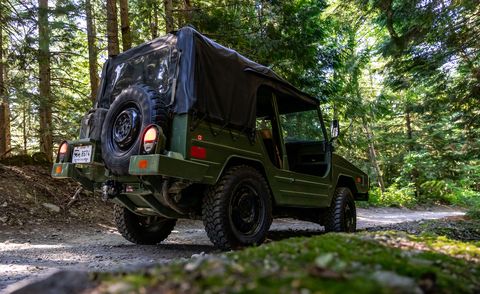
Brendan McAleer
As for any plans to sell a civilian version of the Iltis, the market simply wasn’t there. Bombardier also failed to secure other overseas contracts and ended Iltis production in the mid-1980s. In total, fewer than 10,000 vehicles were built by both VW and Bombardier.
Today, the Canadian Army is equipped with Mercedes G-wagens. The Iltis served until the early 2000s, including in Afghanistan. Here, it earned an unfair reputation for being flimsy. U.S. military commanders took one look at the canvas doors of this 25-year-old VW and warned the Canadians not to venture off base. In reality, a Humvee or a G-wagen would also have provided little protection against land mines.
In its retirement, however, the Iltis is enjoying something of a renaissance. The suspension is crashy, but not really much worse than a contemporary Jeep, and this little machine is hilariously fun to drive. The Canadian owners’ group is very active, and being that it’s a military surplus vehicle, you can occasionally find an Iltis on the cheap. It’s like a budget-friendly miniature Unimog, a G-wagen for those without a lot of G’s.
And further, as a military-spec machine with none of the Call of Duty cosplay of a Humvee or Jeep, the Bombardier Iltis is both rugged and friendly. Which are very Canadian attributes. Whaddya say, bud? Wanna go out fer a rip?
This content is imported from OpenWeb. You may be able to find the same content in another format, or you may be able to find more information, at their web site.



